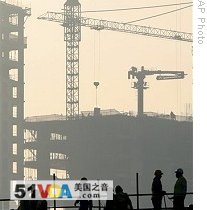Dubai
05 March 2009
 |
| Laborers begin work at a construction site in Dubai, 27 Jan 2009 |
In Dubai's hey day, the sound of construction was everywhere. High rises and tourist resorts were built by legions of foreign workers, most of them from India and Pakistan. Dubai became an international magnet, reinventing itself as a financial capital and tourist mecca in the Persian Gulf. Then the global crisis reached this outpost and boom turned into bust.
Now, these men - like thousands of others - are out of work. They are all from South Asia - 20 or so men sharing a room to cut down on rent as they wait for work. Zafar Abbasi is a steel worker. He came to the United Arab Emirates two years ago, but says he recently lost his job. And, now, without money coming in, life is hard.
 |
| Zafar Abbasi |
These men were among the army of foreign laborers that built Dubai when the economy was booming. Many have been unemployed for more than a month. They say they cannot return home because their employers are holding their passports and have ordered them to wait until work picks up.
More than half of the construction projects in the United Arab Emirates, worth $582 billion, have been put on hold, according to the market research firm, Proleads. Some projects are still going ahead, thanks, in part, to the $10 billion bailout from the UAE's capital, Abu Dhabi. But, many workers are unemployed and stuck here.
Worker advocacy groups - including the United Nations International Labor Organization - have increased pressure for wider protection covering the hundreds of thousands of unskilled construction workers who flooded regions of the Gulf during the building boom and now face the fallout from leaner times.
The demands include ending the illegal-but-common practice of companies holding workers' passports, effectively blocking their chances of looking for other jobs under the country's sponsorship system.
In the meantime, many Western professionals have simply left. Foreign news reports claim 3,000 cars have been abandoned at the Dubai Airport parking lot - left behind by debt-ridden foreigners fleeing the country. Dubai's police chief has angrily refuted the claim.
 |
| Marie-Josee Primeau |
"Mid-January, it was drastic and definitely people have lost their jobs because the economy is based on real estate and also tourism. Definitely it affects a lot of people," she said.
Still, Primeau says she is staying. She says the economic crisis is a challenge.
"It is a chess game. We have to react. I am driven by challenges, so I'm seeing it in a different way," she said.
Richard Thompson, editor of the Middle East Economic Digest, says the region is starting to react to the economic downturn. Dubai has moved to stabilize its economy with its $20 billion sovereign bond program. For the short term, it should be sufficient to meet the city's refinancing needs this year and lend stability to the economy. He says there are reasons to be cautiously optimistic here.
"People are losing their jobs here," he said. "Money is being lost. There is an uncertainty about how long the credit crisis will last. However, we are optimistic of oil prices returning. Banks should start leading at the latter half of this year when the bailouts start filtering through. There will be a very quick rebound in Dubai."
But the foreign laborers say time is not on their side. Zafar Abbasi says he needs to find work soon.
"That is my hope, but I cannot see that. I can hope, only for hope," he said.
It is a hope to return to boom times and to complete a skyline of half-finished buildings - a hope that now seems distant.